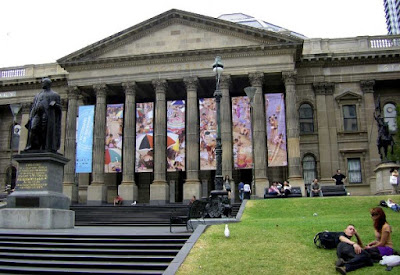 Just saw the new "Hansel and Gretel" at the Met with my friend D. During the intermission between the second and third acts, we were over the moon, couldn't find words of praise extravagant enough for the magic worked in the second act - except "magical." "I could go home right now," I said, and in a way it's a pity we didn't, as the final act - admittedly not an easy one to put on - was mere burlesque (with a tenor singing the witch), and the sublime music got lost. Nevertheless, I doubt I'll soon forget the exquisite rightness of the second act, which in this production (originally from the Welsh National Opera) took place in a big dimly lit room with botanical wallpaper and a long bare table diagonally down the center, which the children's play - and the music played glowingly by the Met Orchestra - turned into a forest first friendly then menacing... and then, as they nodded off to sleep, the most successful dreamlike sequence either of us had ever seen, moving with quiet slowness and lyrical gentleness. After what I've just said you won't believe me if I say that the fourteen angels of the children's lullaby are replaced by fourteen jolly chefs in balloon masks silently laying out a feast, as a fish-headed butler leads the starved children to red-velvet chairs... so I'll just say: you had to be there, I wouldn't have believed it would work so splendidly well had I not been there to see it. This is what the arts of the stage at their most inspired can do!
Just saw the new "Hansel and Gretel" at the Met with my friend D. During the intermission between the second and third acts, we were over the moon, couldn't find words of praise extravagant enough for the magic worked in the second act - except "magical." "I could go home right now," I said, and in a way it's a pity we didn't, as the final act - admittedly not an easy one to put on - was mere burlesque (with a tenor singing the witch), and the sublime music got lost. Nevertheless, I doubt I'll soon forget the exquisite rightness of the second act, which in this production (originally from the Welsh National Opera) took place in a big dimly lit room with botanical wallpaper and a long bare table diagonally down the center, which the children's play - and the music played glowingly by the Met Orchestra - turned into a forest first friendly then menacing... and then, as they nodded off to sleep, the most successful dreamlike sequence either of us had ever seen, moving with quiet slowness and lyrical gentleness. After what I've just said you won't believe me if I say that the fourteen angels of the children's lullaby are replaced by fourteen jolly chefs in balloon masks silently laying out a feast, as a fish-headed butler leads the starved children to red-velvet chairs... so I'll just say: you had to be there, I wouldn't have believed it would work so splendidly well had I not been there to see it. This is what the arts of the stage at their most inspired can do!"Hansel and Gretel," by the way, is quite a lovely opera. D is German, so we both knew that many of the melodies are children's folksongs (not sure very many of the rest of the audience knew this), which made us that much more appreciative of the shimmering Wagnerian things he adds to them and draws out of them. And the story - well, Grimm's fairy tales are too cruel for today's child-rearing! This production dazzled also through the wonderfully true children's movements and play of the sopranos singing the title parts, clearly the work of someone who loves children and knows their rhythms and lightning-speed changes of mood...
We had a recording of "Hansel and Gretel" at home which I know well (I think this is the first production I have seen, but I have a very vivid image of how the last act should look - perhaps from a picture on the record cover?), and so it was my own childhood I was transported to for the first half of the opera - half-way into the magical second act. But once the children lost their way, after the sinister cuckoo song, it was my nephews I was seeing.
























































